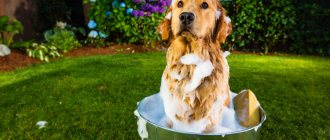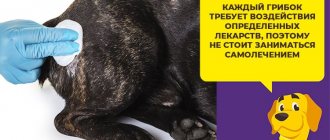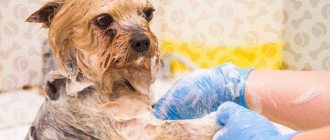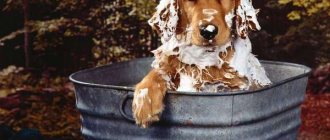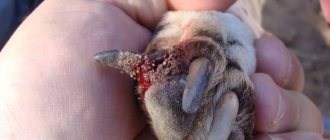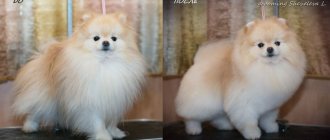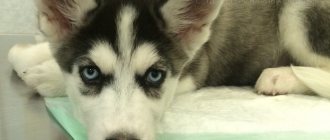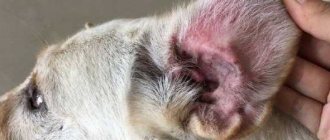Announcement
Many dog owners have a lot of questions about this: what and how often can they wash their dog so as not to harm its health, is it possible to wash the dog with human shampoo, baby, tar and laundry soap, how to wash the dog correctly, and so on. We will try to answer these and other questions in this and other articles dedicated to caring for your four-legged pet.
Is it possible to wash a dog with baby shampoo?
Most people naively believe that baby shampoo can be used to wash a dog because it is made from more “gentle” ingredients. Indeed, manufacturers add fewer chemicals that cause an acid reaction to baby shampoos. But the fact is that the composition of the skin of an adult and a child does not differ that much, and this is taken into account when developing cosmetics.
As a result, the result will not be much different from using regular shampoo. To avoid problems, we recommend not to take risks and still purchase special shampoos for dogs.
How often can you bathe
It is enough to wash our short-haired four-legged friends no more than three times a year, because their skin and coat have a natural protective “lubricant”. Frequent bathing can damage the skin by stripping away its natural protection and causing dandruff and dry skin. After walks, you can limit yourself to washing your paws or cleaning them with wet wipes . It should be noted here that simple splashing with water in the form of a game is not considered washing, since no detergents are used and the wool does not get completely wet.
How to wash a cat if she is afraid of water
If the cat is categorically against water treatments, special shampoos will come to the rescue.
Dry shampoos
Designed for animals that are terribly afraid of water and for emergency situations: when it’s too cold or when you urgently need to get your pet in order.
These shampoos come in the form of a powder that is generously sprinkled onto your pet's fur. It is advisable to choose a bathroom as the location of the operation.
To minimize the consequences and optimize subsequent cleaning of the premises, the cat can be placed in a cardboard box.
The carefully combed fur of the animal is treated with shampoo, and the help of another person will be invaluable. One is holding a cat, the other is applying dry shampoo.
After the procedure, the shampoo is combed out if required by the instructions on the label.
You can use dry shampoo more often than its liquid counterpart, that is, weekly. The composition does not lead to dry skin.
Shampoo sprays
Use like dry shampoo up to twice a week.
Disadvantages of dry shampoo:
- removal of a limited amount of dirt;
- only partial defatting;
- inability to completely comb out the product;
- powder particles getting into the cat's stomach when licking;
- traces of powder on home textiles and furniture.
You shouldn’t place much hope on the cleaning properties of dry shampoo: nothing can replace normal washing.
Sometimes a cat that despairs at the sight of water still has to be bathed. First, the pet needs to trim its claws, and then everything follows the standard algorithm.
Does not require rinsing
What not to wash
There is an opinion that you can wash your pets with anything, any ordinary shampoo, just to restore cleanliness and order. But is it? It has already been said above why dogs should not be washed with shampoo intended for humans. It should also be noted that children's products are not suitable for this role.
Scented, laundry or tar soaps dry out your pet's skin and have an unpleasant odor, so they also cannot be used for washing.
Cat shampoos, although designed for pets, are not suitable for dogs. It’s another matter if it is a combined product that allows it to be used for both cats and dogs without harming their health.
Can I wash with regular shampoo?
Experienced experts recommend using only special shampoos to wash your dog. The fact is that human and dog skin have different acidity. In humans, this indicator is 5.5 pH, and in dogs - 6-7 pH. Shampoos are created taking into account these parameters, so if they are used to wash pets, this will cause a negative reaction on their skin.
In other words, if shampoo is absolutely harmless for a person, then in a dog, due to the different composition of the skin, irritation, rash, itching or even peeling may appear. Moreover, if she licks off particles of detergent that have not been washed off, this will most likely result in an upset stomach at best, and poisoning at worst.
Dog breeders are of the opinion that it is generally not worth bathing puppies under 4 months of age. You can get by simply wiping the paws and fur with a damp cloth. After completing these procedures, wipe your pet dry and under no circumstances leave it in a draft. As soon as he reaches the required age, purchase special cosmetics for washing.
How to clean paws and ears
After walks, it is advisable to clean the animal’s paws of dust and possible contaminants. In order not to bathe them every time after a walk, you can use special shampoos for paws - “Doctor ZOO”, “Gulena”, “Four Paws”, “Shoe”.
While bathing, you should not allow moisture to get into your pet's ears, but this does not mean that you do not need to clean his ears. For this we recommend:
- Doctor VIC hygiene lotion, which fights pathogenic bacteria and fungi;
- Dekta-Forte ear drops;
- ear-cleaner lotion from Beaphar, etc.
What shampoo to wash your dog with
And so, if you nevertheless agree that it is not worth risking the health of your pet, and it is best to use professional cosmetics when bathing, all that remains is to choose the appropriate shampoo from the many possible options.
When choosing shampoos for your pet, you need to consider the following factors:
- breed and age of the dog;
- the purpose of water procedures (just washing or a therapeutic bath);
- type of coat and its length.
For example, if a dog has long hair, you can use softening shampoos; for poodles, cosmetics that prevent the formation of tangles, etc. are ideal. Additionally, you can use conditioner to give the coat shine and silkiness. You can also consider universal shampoos suitable for all types of dogs.
If you can’t decide on a specific shampoo, you can consider the following options from the Danish cosmetics line “KW Grooming”:
KW Lemon Shampoo concentrate 200 ml - 873 RUR | KW Shampoo concentrate with almond oil 200 ml - 879 rub. |
- KW Lemon shampoo . This is a professional detergent that is ideal for both long-haired and short-haired dog breeds. The shampoo gives the coat additional shine and fullness, and can be used for washing pets with sensitive skin.
- KW Shampoo concentrate with almond oil . The shampoo is suitable for dogs with dry and oil-free hair. The unique composition of the chemical elements included in this cleanser normalizes the level of natural oil, thereby making the skin shiny and strong.
KW Black shampoo concentrate 200 ml - 879 rub. | KW White shampoo concentrate 200 ml — 879 rub. |
- KW Black shampoo concentrate . The shampoo is specially designed for dark breeds of dogs. The concentration of chemicals allows you to give the wool a real natural shade, as well as completely strengthen it. In addition, the shampoo makes the coat smooth and shiny, prevents tangles and eliminates static electricity.
- KW White shampoo concentrate . The detergent is specially created for dogs with a white coat. The detergent does not contain dyes or other elements that disturb the white color balance. The shampoo is gentle on the coat and is suitable for dogs of any breed with any coat length.
KW Healing Shampoo concentrate 200 ml - 920 rub. | KW Shampoo concentrate with chlorhexidine 200 ml - 989 rub. |
- KW Therapeutic shampoo concentrate . Designed specifically for dogs suffering from dandruff, dry skin or itching. The unique chemical composition of the cosmetic product will allow you to return the skin to its previous condition, as well as give the coat shine and a pleasant appearance.
LiveInternetLiveInternet
With the light hand of Sarah Jessica Parker, horse shampoo for washing the mane and tail entered the lives of thousands of our compatriots, as a panacea for all possible and impossible hair problems. Of course, seeing her gorgeous hair in perfect condition and reading an interview where she “secretly” tells the secrets of Hollywood that most movie stars use horse shampoo to care for their hair, it’s hard to resist buying the coveted bottle. And looking at beautiful, well-groomed horses with shiny sides, a luxurious mane and a flowing tail; looking at luxurious long-haired dogs at exhibitions, the subject of well-deserved pride of their owners, willy-nilly you begin to believe in the miraculous properties of hair care products.
They buy everything - both men, hoping that their baldness will disappear, and glamorous beauties, hoping to become like the girls from shampoo advertisements. Honestly, the results of such self-experiments are the most unexpected - from an almost instant improvement in the appearance of hair, to the appearance of dandruff, unbearable itching and hair loss. Let's try to figure out what is the secret of such popularity of cosmetics and medicinal products for animals among people.
Everyone knows that hair shampoo should be selected according to the type of hair and scalp: hair can be normal, oily or dry; thick, thin, thick, sparse, hard, soft. Scalp – oily, dry, mixed, normal.
There may be specific problems such as dandruff,
hair loss, exhaustion and dullness. Therefore, in order for our hair to have a healthy and well-groomed appearance, each of the above hair types must be provided with special, individual care.
Shampoos for animals are made based on the physiological parameters characteristic of a particular animal species. Horses have very thick skin, with a large number of sweat glands, and are oily; the mane and tail consist of thick, coarse hair. The action of shampoos made for horses is aimed, first of all, at cleansing large amounts of dirt and old sweat, making it easier to comb the stray hairs of the tail and mane and further preventing their tangling. It is also not unimportant that the pH of a horse’s skin is more acidic than that of a human, and the skin itself is much thicker. Therefore, horse shampoos contain alkali, which dries out the skin, meaning they are only suitable for people with oily scalps. The rest are provided with irritation, dry scalp, dandruff and itching. You should also know that when using shampoo for horses, due to the huge content of surfactants, the dye is washed out very quickly from colored hair.
Do not forget that shampoos for bathing horses from different manufacturers vary greatly in quality and the presence of various additives in them. For comparison, one of the highest quality and most popular shampoos for horses from the German company Effol meets international quality standards for cosmetic products used for humans, so manufacturers can guarantee that their shampoo can safely be used to bathe a horse costing several tens or even hundreds of thousands of euros. But such a shampoo costs, accordingly, from 1000 rubles per bottle. Our domestic shampoos for 150-300 rubles often cause owners to complain about the appearance of dandruff in animals and itching. And if you carefully study the label, you can see the ingredients included in ordinary shampoos for people, there is nothing special there. Therefore, those who are professionally involved in horse breeding traditionally give preference to imported ones, which are of higher quality and have been proven over the years.
cosmetic products for horse care. And Russian shampoos for manes and tails are used, paradoxically, mainly by people. But even with the recommended dilution of 1:10, as advised by manufacturers of shampoos for horses, the concentration of certain substances differs significantly from human shampoos, and this is fraught, even when using the highest quality cosmetics for animals, irritation and allergies. For example, one of the “best sellers” - shampoo with tar and propolis, contains an amount of tar that significantly exceeds all maximum permissible values for humans. And recent studies of this substance have revealed that birch tar, when used for a long time, has strong carcinogenic properties. Draw your own conclusions.
The Internet is simply overflowing with enthusiastic reviews of the “lucky owners” of oily hair, whose hair condition has improved after short-term use of horse shampoos. The fact is that such shampoos contain collagen and lanolin, which, enveloping the hair, make it visually thicker, heavier, straighten and add shine. But with constant use of shampoo, the weighted hair loosens the hair follicles, and hair loss begins. The alkaline environment of the shampoo also plays a role, which gradually destroys the hair shaft. Therefore, when you stop using horse shampoo and return to normal, human hair, the collagen film from the hair is gradually washed off and the hair ends up in an even more deplorable state than before you started using horse shampoo.
It is also worth considering that horses are washed with shampoo extremely rarely, mainly before “ceremonial” events - races, auctions, exhibitions, performances, usually no more than once a month. If you compare it with weekly and sometimes daily hair washing in people, it becomes clear why in most cases the use of zoo shampoos leads to a deterioration in hair quality and subsequent hair loss.
When choosing a shampoo, you should remember that its main purpose is to remove excess oil and impurities from the hair and scalp. No shampoo can stimulate hair growth, since the time it acts directly on the hair is very limited, and the active ingredients contained in shampoos do not penetrate the hair follicles. And how can thick, coarse hair appear if a person’s genes are programmed to be thin and sparse? Lifeless, dull, dry hair and split ends can only be restored by high-quality masks and balms. Leading cosmetic corporations have their own research institutes, which have been leading developments in the field of manufacturing products for the care and treatment of human hair for decades. The result of these studies is the wide variety of high-quality and effective products that we see for professional and everyday use. You can also successfully use folk remedies proven by generations to improve the quality of hair and strengthen it (nettle, chamomile, burdock oil and others). Don’t forget about proper nutrition as a guarantee of beauty and vitality of hair, and the need to take vitamin and mineral complexes.
Choosing cosmetics for animals with all the assortment of shampoos and conditioners designed to solve any problems with hair and scalp in people, to put it mildly, is not safe.
Only those who do not care about their health and the appearance of their hair and the condition of their scalp can use them.
At the same time, I would like to remind animal owners about the inadmissibility of using human shampoos and conditioners for bathing. Of course, there are cats and dogs that can tolerate bathing with laundry soap without harm to their coat or health, but most pets react extremely negatively to cosmetics for people.
And finally, a few more words about Sarah Jessica Parker. Sarah Jessica does not use horse shampoo, but shampoo with horse keratin from MoltoBene, one of the world's leading companies producing professional hair care cosmetics. There really is a horse on the label, and the shampoo itself is suitable for daily use, gently caring for hair and giving it shine. But due to incorrect translation and journalists’ craving for sensations, news about the star’s use of shampoo to wash horses appeared and took root in all media. Be that as it may, Sarah Jessica Parker is beyond our reach, and we will never know what she actually washes her hair with. Therefore, you should not lose common sense and instead of proven shampoos tested for use in humans, switch to cosmetics for animals, since the consequences may be completely unpredictable.
